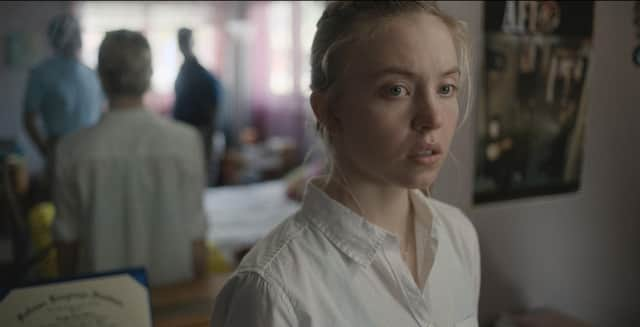Film reviews: Reality | The Boogeyman | Mad About the Boy: The Noël Coward Story | Carmen


Reality (12A) ****
The Boogeyman (15) ***
Mad About the Boy: The Noël Coward Story (12A) **
Carmen (15) **
The truth-evading chaos of the Trump years is evoked with subtle horror in Reality, writer/director Tina Satter’s remarkable drama about the FBI interrogation of the ironically named (but very real) NSA whistleblower Reality Winner. Basing all the dialogue on a verbatim transcript of the FBI’s visit to Winner’s house, Satter’s film – which she adapted from her own 2020 Broadway play Is This A Room – makes for a gripping, formally rigorous thriller, with every “uhm”, “ah” and cough adding an odd kind of tension to the casual, almost banal back-and-forth between Reality, then a 25-year-old linguistics expert working as a translator for a military contractor, and her passive-aggressive male interlocutors, as they attempt to coax her into revealing what she does and doesn’t know about a security breach involving a confidential document containing details of Russian interference in the 2016 US elections.
After a brief prologue shows us Reality (superbly played by Sydney Sweeney) at work surrounded by wall-mounted televisions pumping out Fox News, the film cuts to the day she returned home in June 2017 to find two FBI agents (played by Josh Hamilton and Marchánt Davis) waiting in her driveway, digital audio recorder at the ready. The everyday tedium of the ensuing chat is weirdly unnerving as discussions about pets and powerlifting give way to more unusual details, like the pink firearms Reality keeps in her house. But the film also draws attention to its own elisions. Whenever the film reaches a point in the conversation when the original recording is either unclear or dealing with redacted information, the film glitches and cuts away to a print-out of the transcript – as if Reality’s reality is fracturing, which in a way, it is.
Advertisement
Hide AdSatter finds plenty of inspiration in the limitations imposed on her by the found-footage nature of the script. The setting, for instance, is confined almost entirely to the front yard of Reality’s modest home and a couple of sparsely furnished rooms inside it, yet Satter makes it claustrophobic in intensely cinematic ways by framing her protagonist between the burly bodies of the FBI agents searching her home, or shooting Sweeney’s face in close-ups that let us see the suppressed panic bubbling away beneath all the forced pleasantries. The adherence of all the actors – Sweeney, Hamilton, Davis – to the purity of the process also quietly underscores the extent to which an interrogation of this nature is itself a performance, adding further layers of irony to the film’s sly exploration of the insidious and destabilising effect the wilful distortion of reality can have on society at large.


After breaking through with the inventive Zoom-based supernatural chiller Host during lockdown, then following up with last year’s riotous found-footage film DASHCAM, British horror director Rob Savage steps up to the big leagues, so to speak, with The Boogeyman, a slickly made Stephen King adaptation that provides a more conventional showcase for his undeniable craftsmanship. Based on one of King’s nastier short stories (you can read it in Night Shift), the film expands its monster-in-the-closet premise into a story about a grief-stricken family coming apart at the seams.
The family in question is headed by Chris Messina’s recently widowed Will Harper, a psychiatrist whose inability to confront the death of his wife is driving a wedge between him and his daughters Sadie (Sophie Thatcher) and Sawyer (Vivien Lyre Blair). Although King’s story was structured as a dialogue between a therapist and a male patient convinced that the titular demon had killed his three children, the film integrates this into the set-up, with Damien Dastmalchian on particularly unsettling form as the aforementioned father, a man whose desperation to unburden himself to Dr Harper results in the Boogeyman attaching itself to the tragic aura of the Harper household. Working from a script by Mark Herman and A Quiet Place writers Scott Beck and Bryan Woods, Savage takes this demon-as-contagion idea and runs with it, making grief a gateway to the supernatural and skipping over some of the more illogical plotting with fluid set-pieces that make creative use of light and shadow to ratchet up the tension.
Mad About the Boy: The Noël Coward Story eschews all the advances biographical documentaries have made in recent years in favour of a very old-school account of this very English playwright, composer, actor, singer and all-round bon vivant’s life. Narrated by Alan Cumming, it pulls together a few witty chat show appearances, film clips and some home movies to illustrate Coward’s droll delivery, clever wordplay and fabulous lifestyle, but largely leans on a shallow recounting of biographical facts to spell out his place in history. A better film would have used his life to interrogate that history.
The new film version of Carmen isn’t so much an update of the Bizet opera as an aimless mix of contemporary dance and musical theatre presented in the guise of a melodramatic crime movie. In the Heights star Melissa Barrera takes the title role, re-imagined here as an illegal Mexican immigrant who goes on the run with a former US marine (Aftersun’s Paul Mescal) after a border crossing turns bloody. Saddled with a thin script and Mescal’s wandering accent, the actors struggle to generate much heat while choreographer-turned-director Benjamin Millepied struggles to integrate all the disparate elements – including Succession composer Nicholas Britell’s erratic score and Malick veteran Jörg Widmer’s dreamy cinematography – into a cohesive whole.
All films on general release from 2 June